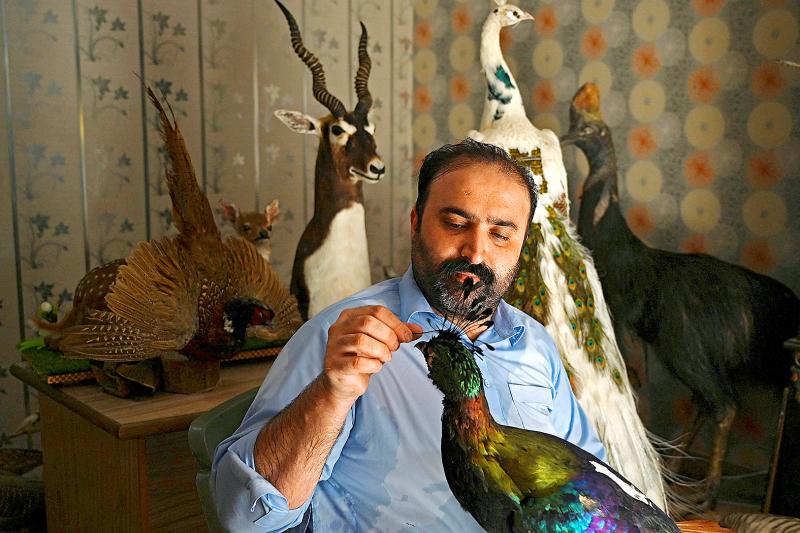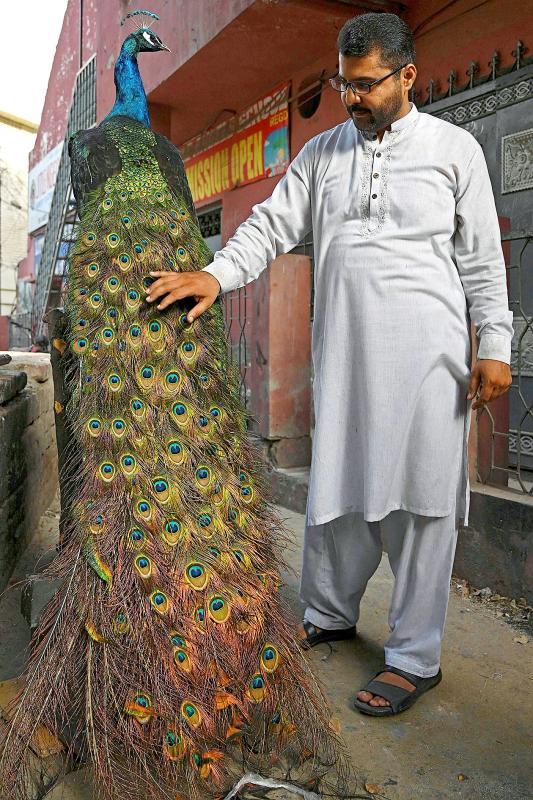Carefully preserving an animal takes patience and attention to detail — luxuries Pakistani Jahangir Khan Jadoon says he doesn’t always have when a bereaved pet owner rushes into his workshop.
“Sometimes an emotional customer will bring his dead pet with tears still in his eyes saying, ‘I can’t live even a night without him,’” says the taxidermist from his studio near the eastern city of Lahore.
Surrounded by stuffed leopards, deers, parrots and cats, Jadoon sees his craft as both an art and a vital way to console those in pain. Some animals can take days to properly preserve while others take weeks, depending on the size and particulars of the animal.

Photo: AFP
First the skin is carefully removed, washed and then exposed to the sun. The animals are then stuffed and carefully sown back together while their eyes are replaced with glass balls.
But there are times, Jadoon admits, when he has only hours to bring comfort to a distraught client, making the delicate process all the more difficult.
“Someone with a parrot or a cat will come and request us to preserve the pet as soon as possible. They say: ‘do it now.’ So in such cases we have to apply extra chemicals. Even then it can take hours,” he adds.

Photo: AFP
Over the years, Jadoon has seen a wide range of species brought into his workshop, from rare leopards to a cassowary bird that lived in a Pakistan zoo for decades.
“I learned this skill from my forefathers. My grandfather started it in 1918 after a deer died in Lahore’s zoo,” says Jadoon, adding that he has also stuffed his fair share of animals that merely serve as decorations for fancy homes.
‘WHY IS IT NOT MOVING?’
A growing taste among elite Pakistanis for exotic pets — especially big cats seen as symbols of wealth and power — has also spilled over into his work.
“Most people prefer a cat or a dog, a parrot or a peacock as their pet. But nowadays, there’s a new trend of raising lions,” Jadoon says.
He has helped establish a collection at a university museum, where those studying ecology and conservation can learn more about the delicate trade.
“This type of museum provides an opportunity to the students,” said Arshad Javid, who heads the Wildlife and Ecology Department at the University of Veterinary and Animal Sciences in Lahore.
“They can see them here, they can identify the difference among the species.”
But dealing with a pet and their owners is a different matter and involves more than just a deep understanding of the art of taxidermy. The act of preserving a pet can be cathartic for its owners but it is not always the panacea for coping with despair.
Hafiz Mohammad Fahim decided to stuff his family’s pet peacock following his sudden death after seven years of bringing joy to his children.
The peacock now serves as a “memorial,” even if his children are no longer able to interact with it.
“My kids had an attachment with him,” said Fahim. “Now they are sad and ask why it is not moving.”

One of the biggest sore spots in Taiwan’s historical friendship with the US came in 1979 when US president Jimmy Carter broke off formal diplomatic relations with Taiwan’s Republic of China (ROC) government so that the US could establish relations with the People’s Republic of China (PRC). Taiwan’s derecognition came purely at China’s insistence, and the US took the deal. Retired American diplomat John Tkacik, who for almost decade surrounding that schism, from 1974 to 1982, worked in embassies in Taipei and Beijing and at the Taiwan Desk in Washington DC, recently argued in the Taipei Times that “President Carter’s derecognition

This year will go down in the history books. Taiwan faces enormous turmoil and uncertainty in the coming months. Which political parties are in a good position to handle big changes? All of the main parties are beset with challenges. Taking stock, this column examined the Taiwan People’s Party (TPP) (“Huang Kuo-chang’s choking the life out of the TPP,” May 28, page 12), the Democratic Progressive Party (DPP) (“Challenges amid choppy waters for the DPP,” June 14, page 12) and the Chinese Nationalist Party (KMT) (“KMT struggles to seize opportunities as ‘interesting times’ loom,” June 20, page 11). Times like these can

Dr. Y. Tony Yang, Associate Dean of Health Policy and Population Science at George Washington University, argued last week in a piece for the Taipei Times about former president Ma Ying-jeou (馬英九) leading a student delegation to the People’s Republic of China (PRC) that, “The real question is not whether Ma’s visit helps or hurts Taiwan — it is why Taiwan lacks a sophisticated, multi-track approach to one of the most complex geopolitical relationships in the world” (“Ma’s Visit, DPP’s Blind Spot,” June 18, page 8). Yang contends that the Democratic Progressive Party (DPP) has a blind spot: “By treating any

You can tell a lot about a generation from the contents of their cool box: nowadays the barbecue ice bucket is likely to be filled with hard seltzers, non-alcoholic beers and fluorescent BuzzBallz — a particular favorite among Gen Z. Two decades ago, it was WKD, Bacardi Breezers and the odd Smirnoff Ice bobbing in a puddle of melted ice. And while nostalgia may have brought back some alcopops, the new wave of ready-to-drink (RTD) options look and taste noticeably different. It is not just the drinks that have changed, but drinking habits too, driven in part by more health-conscious consumers and